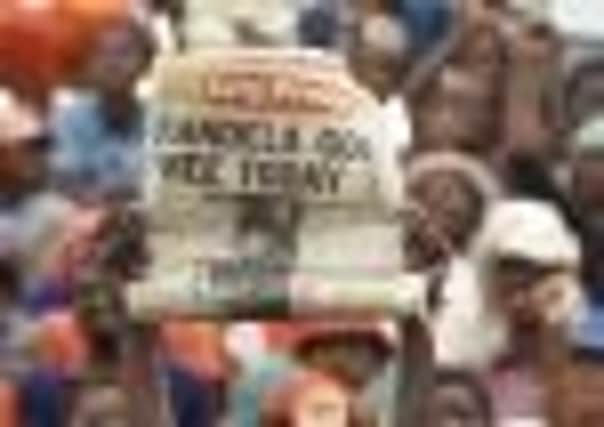ANC celebrate a century of struggle but the war is now within


By the end of the gathering the African National Congress (ANC) had been born.
After an epic struggle spanning more than eight decades, the ANC ultimately emerged victorious when Nelson Mandela was elected South Africa’s first black President in 1994.
Advertisement
Hide AdAdvertisement
Hide AdThe party has won every national election since racist white rule ended and President Jacob Zuma vows the ANC “will rule until Jesus comes”.
But, as more than 100,000 people gather for tomorrow’s centenary celebrations in and around that same Bloemfontein church, the ANC is at war with itself.
Unemployment hovers around 36 per cent and soars to 70 per cent among young people. Half the country’s population lives on just 8 per cent of the national income, according to the Congress of South African Trade Unions.
South African political analyst Aubrey Matshiqi praises the ANC for developmental achievements “unprecedented anywhere in the world” in its 17 years of governing the country.
But he noted that many at the ANC festivities will have their joy marred by “a tinge of disappointment and even sadness” about weaknesses and failures.
The movement’s 100-year history is rich with heroic moments that saw it survive tumultuous and oppressive times, but unsavoury power struggles and rampant corruption are the big features of its current politics.
Tomorrow’s programme illustrates its internal crisis. President Jacob Zuma, who has entrenched a culture of graft in the party’s top ranks, is the only person who will address the gathering: that is against party traditions in which all the top leaders address the party faithful at the annual birthday bash. The decision has been made in order to gag the rabble-rousing ANC Youth League President, Julius Malema.
Mr Malema, who seeks nationalisation of the country’s mines, is awaiting the outcome of his appeal against a five-year suspension from the ANC for being disrespectful to the party’s leaders and flouting the movement’s constitution.
Advertisement
Hide AdAdvertisement
Hide AdWhile the ANC has lost the support of many of its former middle class followers, it has felt confident of the solid support of the black poor, who are the majority population, leading Zuma to predict confidently that the party “will rule until Jesus comes back”.
But with unemployment so high among young people, who do not remember apartheid, support for the ANC is eroding around the edges.
Serame Mogale, who was just 14 when he became a guerrilla fighter for the then banned ANC, recalled that “the pace of the slowest” was the slogan in his East German-run training camp in Angola. “We would run six hours nonstop with female comrades in front, from whom the whole company or platoon would take the pace,” he said. “But today the weakest is overtaken and left behind to tire and die.”
Even the Congress of South African Trade Unions (Cosatu), the ANC’s close alliance partner, is growing disillusioned. Cosatu secretary-general Zwelinzima Vavi has warned that South Africa is “slipping into a predatory state where a new tier of leaders believe it’s their turn to feed”.
As well as the rally, the celebrations will include a gala dinner in Bloemfontein attended by 46 heads of state. But the movement’s key icon, Nelson Mandela, will be missing.
The 93-year-old icon’s public appearances have become increasingly rare, though he did attend the closing ceremony of the World Cup in 2010.
TIMELINE
1912: Founding of South African Native National Congress, precursor to ANC.
1923: Name changed to African National Congress.
1955: The Congress Alliance – of the ANC and Indian, mixed-race and white organisations – holds the Congress of the People in Soweto. Congress adopts the Freedom Charter calling for a nonracial democracy and a socialist-based economy.
Advertisement
Hide AdAdvertisement
Hide Ad1956: Nelson Mandela and 155 others who supported the Freedom Charter charged with treason. All acquitted after a four-year trial.
1960: ANC banned.
1961: Founding of ANC’s guerrilla wingSpear of the Nation.
1964: Mandela found guilty of sabotage at Rivonia Trial and sentenced to life imprisonment.
1990: ANC and other groups unbanned; Mandela released.
1991: Mandela elected president of ANC. The government, ANC and 17 other political groups begin formal negotiations on a new constitution.
1994: ANC wins first all-race elections; Mandela becomes president.
1999: Thabo Mbeki succeeds Mandela as the country’s president.
2007: ANC elects Jacob Zuma as party president over Mbeki, putting Zuma in line to run for the presidency.
2009: ANC sweeps parliamentary elections and Zuma becomes president.
2011: ANC fires Youth League leader Julius Malema and suspends him from the party for five years.